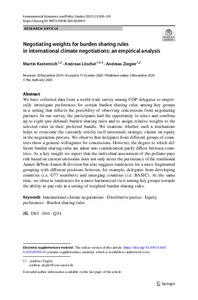| dc.date.accessioned | 2021-04-26T10:21:20Z | |
| dc.date.available | 2021-04-26T10:21:20Z | |
| dc.date.issued | 2020-11-03 | |
| dc.identifier | doi:10.17170/kobra-202104133657 | |
| dc.identifier.uri | http://hdl.handle.net/123456789/12738 | |
| dc.description.sponsorship | Gefördert im Rahmen des Projekts DEAL | ger |
| dc.language.iso | eng | eng |
| dc.rights | Namensnennung 4.0 International | * |
| dc.rights.uri | http://creativecommons.org/licenses/by/4.0/ | * |
| dc.subject | international climate negotiations | eng |
| dc.subject | distributive justice | eng |
| dc.subject | equity preferences | eng |
| dc.subject | burden sharing rules | eng |
| dc.subject.ddc | 330 | |
| dc.subject.ddc | 333 | |
| dc.title | Negotiating weights for burden sharing rules in international climate negotiations: an empirical analysis | eng |
| dc.type | Aufsatz | |
| dcterms.abstract | We have collected data from a world-wide survey among COP delegates to empirically investigate preferences for certain burden sharing rules among key groups in a setting that reflects the possibility of observing concessions from negotiating partners. In our survey, the participants had the opportunity to select and combine up to eight (pre-defined) burden sharing rules and to assign relative weights to the selected rules in their preferred bundle. We examine whether such a mechanism helps to overcome the currently strictly (self-interested) strategic claims on equity in the negotiation process. We observe that delegates from different groups of countries show a general willingness for concessions. However, the degree to which different burden sharing rules are taken into consideration partly differs between countries. As a key insight we report that the individual assessment of the polluter-pays rule based on current emissions does not only stress the persistence of the traditional Annex-B/Non-Annex-B division but also suggests tendencies for a more fragmented grouping with different positions between, for example, delegates from developing countries (i.e. G77 members) and emerging countries (i.e. BASIC). At the same time, we observe tendencies for a more harmonized view among key groups towards the ability-to-pay rule in a setting of weighted burden sharing rules. | eng |
| dcterms.accessRights | open access | |
| dcterms.creator | Kesternich, Martin | |
| dcterms.creator | Löschel, Andreas | |
| dcterms.creator | Ziegler, Andreas | |
| dc.relation.doi | doi:10.1007/s10018-020-00289-0 | |
| dc.subject.swd | Internationaler Umweltschutz | ger |
| dc.subject.swd | Verhandlung | ger |
| dc.subject.swd | Klimaänderung | ger |
| dc.subject.swd | Verteilungsgerechtigkeit | ger |
| dc.subject.swd | Kostenverteilung | ger |
| dc.type.version | publishedVersion | |
| dcterms.source.identifier | EISSN 1867-383X | |
| dcterms.source.issue | Issue 2 | |
| dcterms.source.journal | Environmental Economics and Policy Studies | eng |
| dcterms.source.pageinfo | 309-331 | |
| dcterms.source.volume | Volume 23 | |
| kup.iskup | false | |


